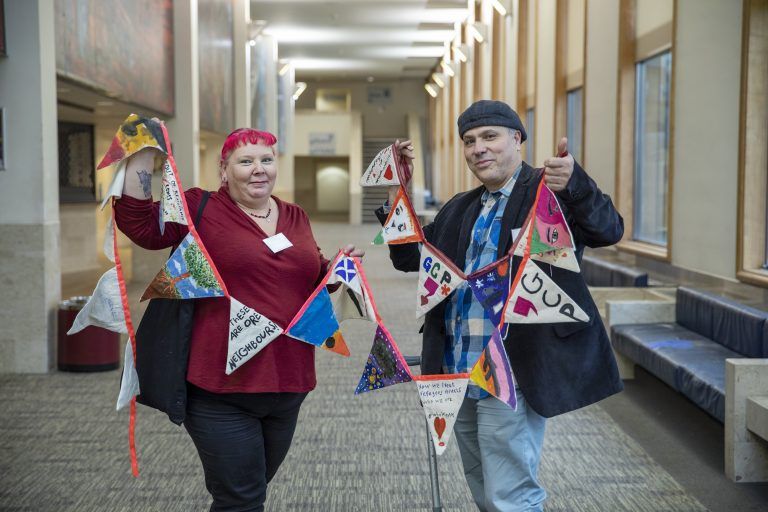Our project is concerned with conversational language development and social integration; in many ways they are interdependent. It is by having the ability, for example, to vocally empathise with our peers, share humour and anecdotes and even to make small talk that we feel more connected, accepted and valued.
ESOL: Beyond the classroom, East Lothian Council


The primary aim was to integrate young people locally with their community whilst promoting physical activity and promote good mental health & wellbeing.
Key Information
Geographical reach
East Lothian
Dates
25/10/2021 – 30/11/2022
Target Groups
Refugees, Asylum Seekers, Syrian Refugees, Ukranian Refugees, Refugees from Hong Kong
Project Type
Spreading good practice
Background
It has long been my personal experience as an ESOL lecturer, tutor and now Employability Development Officer (ESOL) that learners often attempt to utilise what informal/conversational language skills they possess more readily outside of the classroom environment than inside it. There are different factors that account for this but the change in context is fundamental. In fact, at the Home Office Resettlement and Community Sponsorship ‘to-be’ journey mapping workshop feedback from resettled refugees in London was that they felt they learnt more from talking to caseworkers than in ESOL classes as it was quite formal learning that didn’t work for them. Of course, this is not the case for everyone but it does seem to be more common for learners with low level English and/or limited academic attainment in Syria.
Offering informal learning opportunities on a regular basis would capitalise on the benefits the change in context presents. We have recently opened a conversation class for our Syrian learners, which is in addition to their Home Office requirements, and is on a weekly basis. It is designed to act as a taster for the ESOL café and has brought together learners from different parts of the region online. Attendance is steadily increasing but there is a core group of regular attenders. They are of mixed levels so the conversation does not flow as naturally as it might but it demonstrates the desire and willingness to engage in such a way. All attendees have expressed a desire to meet as a group on a face-to-face basis and feel that more learners would then get involved also. In addition, we have a conversation group for our Employability ESOL learners and this is very well-attended. All have expressed a strong interest in our ESOL café project and also would like the opportunity to meet in person.
We currently have 2 Syrian learners who are in the process of engaging with our one-to-one employability support, one of whom is also attending Edinburgh College. This has arisen from discussions with their Tenancy Support Officer and ESOL tutor and without the benefit of a specific service to signpost them accordingly. Other learners have expressed tentative interest in working on their employability skills, particularly in terms of CV writing as they progress through the period of their Home Office funding and one of our Employability Development Officers has suggested a women-only group to focus on confidence building and team dynamics initially as a response to learner feedback from tutors.
Involvement of New Scots in project
The involvement of young New Scots was vital in how we demonstrated and listened to what our young people told us. The activities we undertook all came from the young people we supported. They were all assessed, and a plan was draw up on the best way we could support them.
- During initial assessment and relationship building we heard and recorder the voices of young people both in terms of their individual plans but also how they wanted the project to be delivered. As a result group work was tailor made to the request of young people while accommodating varying cultural needs.
- Planning meetings – e.g. residential trip.
- Relational approach ensured voices heard
Impact
Our Conversation cafes and drop-in service were very successful throughout the duration of the project. I have reported on these at length in previous reports and will go on to provide examples and feedback in other sections of this one. It some ways it has been “more of the same” in this final quarter, working with an established formula and responding to learner needs.
All of our activities have taken place online, which has been both a positive and negative experience. Some learners have accessed the sessions online more readily than if they had had to travel, particularly a pregnant learner, but the dynamics of a busy conversation hub have eluded us, unfortunately.
We were not able to facilitate self-access centres due to the necessity of a physical base to store materials -our main office is still “mothballed” as a result of Covid-but learners have rarely requested support with their studies anyway. Possibly this is due to the wealth of online materials and resources that have become available since the pandemic and our tutors direct learners to them accordingly.
We have not offered Employability groupwork sessions as there wasn’t the demand for them; instead, we worked with individual learners mainly around self-employment.
In terms of additional activities, we have delivered ESOL classes online (and in-person) for our many Ukrainian arrivals- we are currently providing a service to almost 40 learners. We offer General English classes and Conversation groups, together with Employability support. Our AMIF grant enabled us to set up such provision quickly and efficiently and supported our offer until targeted Scottish Government funding became available.

Challenges encountered
Our biggest challenge was Covid and the subsequent lockdown. This resulted in us having an online presence only. In addition, the arrival of a large number of Ukrainian learners at a time when we usually ‘wind down’ our ESOL delivery for the summer months meant extra demands on our sessional tutors and the need to recruit more.
Solutions
We managed to place everyone either in an online class or one of two face-to-face classes. This also required additional administrative support and the need for our AMIF lead to divert time away from other duties.
Reflections
Our AMIF project has been, at times, challenging in terms of staff capacity, particularly as we made the initial transition to online delivery and with the arrival of the families from Ukraine, but it has also been a very rewarding experience. The tutors have gained a greater insight into the lives of their learners due to the informal context they have delivered sessions in and the learners themselves have progressed with their lives, achieving SQA units and other qualifications. The main thing we would do differently would be to have in-person cafes.
Our recommendations to other organisations would centre around the resilience and adaptability of both staff and learners alike. Our project shows that, despite extremely adverse conditions and the need for a complete overhaul of our original plans, something beneficial and successful can be achieved if you respond with a willingness to overcome such difficulties.
Further Information
We would like to continue both the Conversation cafes and drop-ins and are looking at alternative sources of funding to enable us to do so. As already mentioned, the Conversation groups for Ukrainian learners are based on those we offered with AMIF funding. Also, our EIO will continue to offer employability support to our Syrian, Ukrainian, UASC and ESOL learners for the duration of the available funding for her post.


